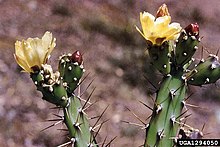Opuntia aurantiaca
| Opuntia aurantiaca | |
|---|---|

| |
| Scientific classification | |
| Kingdom: | Plantae |
| Clade: | Tracheophytes |
| Clade: | Angiosperms |
| Clade: | Eudicots |
| Order: | Caryophyllales |
| Family: | Cactaceae |
| Genus: | Opuntia |
| Species: | O. aurantiaca
|
| Binomial name | |
| Opuntia aurantiaca Lindl.[2]
| |
Opuntia aurantiaca, commonly known as tiger-pear, jointed cactus or jointed prickly-pear, is a species of cactus from South America.[2] The species occurs naturally in Argentina, Paraguay and Uruguay and is considered an invasive species in Africa and Australia.[2]
It was declared a Weed of National Significance by the Australian Weeds Committee in April 2012, and was reported by the Committee to be the most troublesome of all cactus species in New South Wales and the worst Opuntia species in Queensland. It is currently controlled biologically in Australia using the cochineal insect , and to a lesser extent by the larvae of two moths, Cactoblastis cactorum and Tucumania tapiacola.
See also[]
References[]
- ^ Oakley, L. & Pin, A. 2017. Opuntia aurantiaca (amended version of 2013 assessment). The IUCN Red List of Threatened Species 2017: e.T152714A121606355. https://dx.doi.org/10.2305/IUCN.UK.2017-3.RLTS.T152714A121606355.en. Downloaded on 29 August 2021.
- ^ a b c "Opuntia aurantiaca". Germplasm Resources Information Network (GRIN). Agricultural Research Service (ARS), United States Department of Agriculture (USDA). Retrieved 9 April 2011.
Categories:
- IUCN Red List least concern species
- Opuntia
- Cacti of South America
- Flora of Argentina
- Flora of Paraguay
- Flora of Uruguay
- Flora naturalised in Australia
- Plants described in 1833
- Cactus stubs
